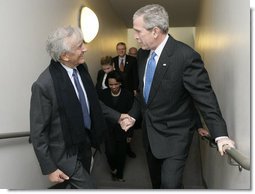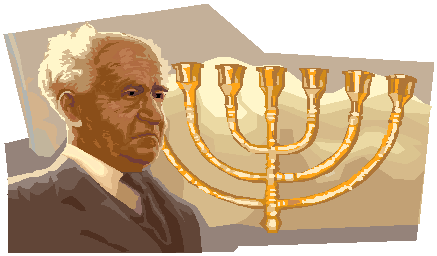Bush, at Holocaust Museum, threatens
more Sudan sanctions over Darfur
Editor's Note: Here is a partial White House transcript of President
George W. Bush's speech this morning at the U.S. Holocaust Memorial Museum at which
he drew parallels between the Holocaust and the genocide in the Darfur
region of the Sudan, and outlined U.S. policy toward the Sudan.
 |
I want to thank the members of Congress who have joined
us, appreciate
you taking time. I thank the members of the diplomatic community who
have joined us. I'm honored that you are here. I thank the survivors
of the Holocaust who have graced us with your presence. (Applause.)
|
| President George W. Bush
is greeted by Elie Wiesel, Founding Chairman of the United States
Holocaust Memorial Museum, after arriving Wednesday, April 18, 2007,
to deliver remarks in commemoration of the Holocaust Days of
Remembrance. White House photo by Eric Draper |
We meet at a time of sorrow for our nation. Our flags fly at half-mast
in memory of 32 souls whose lives were taken at Virginia Tech on Monday
morning.
|
That day we saw horror, but we also saw acts of quiet courage.
We saw this courage in a teacher named Liviu Librescu. With the gunman
set to enter his class, this brave professor blocked the door with his
body while his students fled to safety. On the Day of Remembrance, this
Holocaust survivor gave his own life so that others might live. And
this morning we honor his memory, and we take strength from his example.
This is a place devoted to memory. Inside this building are etched the
words of the Prophet Isaiah: "You are my witness." As part of this
witness, these walls show how one of the world's most advanced nations
embraced a policy aimed at the annihilation of the Jewish people. These
walls help restore the humanity of the millions who were loaded into
trains and murdered by men who considered themselves cultured. And
these walls remind us that the Holocaust was not inevitable -- it was
allowed to gather strength and force only because of the world's
weakness and appeasement in the face of evil.
Today we call what happened "genocide." But when the Holocaust started,
this word did not yet exist. In a 1941 radio address, Churchill spoke
of the horrors the Nazis were visiting on innocent civilians in Russia.
He said, "We are in the presence of a crime without a name." It is an
apt description of the evil that followed the swastika. Mankind had
long experience with savagery and slaughter before. Yet in places such
as Auschwitz and Dachau and Buchenwald, the world saw something new and
terrible: the state-sanctioned extermination of a people -- carried out
with a chilling industrial efficiency of a so-called modern nation.
Some may be tempted to ask: Why have a museum dedicated to such a dark
subject? The men and women who built this museum will tell you:
Because evil is not just a chapter in history -- it is a reality in the
human heart. So this museum serves as a living reminder of what happens
when good and decent people avert their eyes from hatred and murder. It
honors those who died by serving as the conscience for those who live.
And it reminds us that the words "never again" do not refer to the past
-- they refer to the future.
You who are survivors know why the Holocaust must be taught to every
generation. You who lost your families to the gas chambers of Europe
watch as Jewish cemeteries and synagogues across that continent are
defaced and defiled. You who bear the tattoos of death camps hear the
leader of Iran declare that the Holocaust is a "myth." You who have
found refuge in a Jewish homeland know that tyrants and terrorists have
vowed to wipe it from the map. And you who have survived evil know that
the only way to defeat it is to look it in the face, and not back down.
It is evil we are now seeing in Sudan -- and we're not going to back
down. For 22 years, Sudan was plagued by a civil war between the north
and south that claimed more than 2 million lives. That war came to an
end in January 2005, when Sudan's government and rebels in the south
signed a comprehensive peace agreement that the United States helped to
broker. Under this historic accord, Sudan established a Government of
National Unity that includes a First Vice President and other cabinet
members from the country's south. It also established a government for
Southern Sudan that the United States is providing with aid and other
assistance.
Unfortunately, just as peace was coming to the south, another conflict
broke out in the west -- where rebel groups in Darfur attacked
government outposts. To fight this rebellion, the government in
Khartoum unleashed a horse-mounted militia called the Janjaweed, which
carried out systematic assaults against innocent civilians.
The human toll has been staggering. More than 200,000 people have died
from the conflict -- or from the malnutrition and disease that have
spread in its wake. And more than 2 million people have been forced
from their homes and villages into camps both inside and outside their
country.
Ending the violence in Darfur requires better security for the people of
Darfur; it requires progress toward political reconciliation. Today,
more than 7,000 African Union troops have been deployed to Darfur and
they serve courageously. But the problem is the area they patrol is the
size of Texas -- 7,000 people is not enough to provide the security the
people of Darfur need. Ultimately the violence will continue until
Sudan's government and the rebel groups reach a political settlement
that includes traditional community leaders, representatives of civil
society, and African and Arab tribes in the region.
This museum cannot stop the violence. But through your good work,
you're making it impossible for the world to turn a blind eye. Earlier
I saw an exhibit that puts faces on the millions of men, women, and
children who have been killed or driven into the desert. I also saw an
interesting new venture that you've arranged with Google Earth. As a
result of this partnership, millions of Internet users around the world
will be able to zoom in and see satellite images of the burnt-out
villages and mosques and schools. No one who sees these pictures can
doubt that genocide is the only word for what is happening in Darfur --
and that we have a moral obligation to stop it.
The United States is helping to lead this effort. Last May, I announced
an agreement for Darfur that we helped broker between the Sudanese
government and the largest rebel group. It's a positive agreement. It
gave us some sense of optimism that we could help stop the genocide.
Under this agreement, Sudan's government promised to disarm the
Janjaweed and punish all those who violate the cease-fire. The main
rebel group agreed to withdraw into specified areas.
In August, the United Nations followed up this agreement with a new
Security Council resolution. This resolution authorized the U.N.
Mission in Sudan to extend its forces to Darfur -- and to transform the
existing AU forces into a larger, better equipped U.N. peacekeeping
mission. The U.N. recognized there were not enough forces in Darfur to
bring security and peace.
In November, the United Nations, the African Union, the EU, the Arab
League, the government of Sudan, the United States, and 12 other nations
reached another important agreement at a meeting in Addis Ababa. This
agreement strengthened the terms of the cease-fire; it re-energized the
political process and called for a joint U.N.-AU peacekeeping force to
go into action, a force that would be nearly three times the size of the
existing AU force.
These are all good agreements. They represent a clear plan to end the
conflict. And if implemented, they would allow the people of Darfur to
return home to their villages safely, and begin to rebuild their lives
in peace.
Unfortunately, these agreements have been routinely violated. Sudan's
government has moved arms to Darfur, conducted bombing raids on
villages, they've used military vehicles and aircraft that are painted
white -- which makes them look like those deployed by humanitarian
agencies and peacekeeping forces.
Many rebel groups have also pursued violence instead of peace. The
groups who have not signed onto last May's peace accord have splintered,
and they're roaming the Darfur countryside pillaging and stealing at
will. They have killed civilians, they've plundered vehicles and
plundered supplies from international aid workers, they've added to the
lawlessness. The government in Khartoum has been unable to control the
problem -- and they made it even worse last fall with a failed military
campaign designed to crush the groups.
While there is now a temporary lull in the fighting between
the
government and militias and rebel groups, millions of displaced people
remain highly vulnerable to attack. The increased lawlessness and
instability has made it difficult for aid workers to deliver relief to
those who need it -- some organizations have been forced to evacuate
their staff for safety reasons. Once again, the consequences are being
borne by defenseless men, women and children. That is the story being
told here at the Holocaust Museum, and I appreciate what you're doing.
The brutal treatment of innocent civilians in Darfur is unacceptable --
it is unacceptable to me, it is unacceptable to Americans, it's
unacceptable to the United Nations -- at least, that's what they've
said. This status quo must not continue.
Just this week, Sudan's government reached an agreement with the United
Nations to allow 3,000 U.N. troops and their equipment into the country
to support the AU force. The world has heard these promises from Sudan
before. President Bashir's record has been to promise cooperation while
finding new ways to subvert and obstruct the U.N.'s efforts to bring
peace to his country. The time for promises is over -- President Bashir
must act.
The Secretary General of the United Nations, Ban Ki-moon, is now in
discussions with President Bashir to get the government of Sudan to meet
all its commitments. President Bashir should take the last chance by
responding to the Secretary General's efforts -- and to meet the just
demands of the international community. He must follow through on the
deployment of the U.N. support forces. He must allow the deployment of
the full, joint U.N.-African Union peacekeeping force -- and take every
necessary step to facilitate its deployment. He must end support for
the Janjaweed, he must reach out to the rebel leaders, and allow
humanitarian aid to reach the people of Darfur. And he must stop his
pattern of obstruction once and for all.
I have made a decision to allow the Secretary General more time to
pursue his diplomacy. However, if President Bashir does not fulfill the
steps I outlined above in a short period of time, my administration will
take the following steps:
First, the Department of the Treasury will tighten U.S. economic
sanctions on Sudan. This new effort will allow the United States to
enforce more aggressively existing sanctions against Sudan's government,
by blocking any of its dollar transactions within the U.S. financial
system. As part of this effort, the Treasury Department will add 29
companies owned or controlled by the government of Sudan to its list of
Specially Designated Nationals. This designation will bar these
companies from the U.S. financial system -- and make it a crime for U.S.
-- American companies and individuals to willfully do business with
them.
Second, we will also target sanctions against individuals responsible
for the violence. These sanctions will isolate designated individuals
by cutting them off from the U.S. financial system, preventing them from
doing business with any American citizen or company, and calling the
world's attention to their crimes.
Third, I will direct the Secretary of State to prepare a new United
Nations Security Council resolution. This resolution will apply new
sanctions against the government of Sudan -- and against individuals
found to be violating human rights or obstructing the peace process. It
will impose an expanded embargo on arms sales to the government of
Sudan. It will prohibit Sudan's government from conducting any
offensive military flights over Darfur. It will strengthen our ability
to monitor and report any violations. And in the next days, we will
begin consulting with other Security Council members on the terms of
such a resolution.
If Sudan's obstruction continues despite these measures, we will also
consider other options. Last week, I sent Deputy Secretary of State
Negroponte to the region. He informed Sudan's government and rebel
groups that our patience is limited, that we care deeply about the human
condition in Darfur, that it matters to the United States that people
are suffering. I have spoken in the past about the need to end Sudan's
use of military aircraft to attack innocent civilians. We're also are
looking at what steps the international community could take to deny
Sudan's government the ability to fly its military aircraft over Darfur.
And if we do not begin to see signs of good faith and commitments, we
will hear calls for even sterner measures.
The situation doesn't have to come to that. I urge the United Nations
Security Council and the African Union and all members of the
international community to stand behind the Addis Ababa framework and
reject efforts to obstruct its implementation. The world needs to act.
If President Bashir does not meet his obligations to the United States
of America, we'll act. (Applause.)
As we continue to pressure the government of Sudan to meet its
commitments, we will continue our engagement in support of the people of
Darfur. My administration is increasing support for the Transitional
Darfur Regional Authority -- it's an interim authority designed to help
the people of Darfur improve local government and build foundations for
a healthy economy. We are increasing support for Sudan's First Vice
President and the United Nations and African Union special envoys, who
are working to bring the rebel groups together and get them to sign on
to the peace process.
We're continuing our humanitarian assistance to the people of Darfur.
Since 2005, the United States has devoted more than $2 billion to
humanitarian relief and development -- and I thank the American people
for their generosity. We'll continue to bring relief to the people of
Darfur. We'll continue to insist that rebel groups and the Sudanese
government allow international workers to deliver this relief to the
people who depend on it.
All of the people in this room and people in this country have a vital
role to play. Everyone ought to raise their voice. We ought to
continue to demand that the genocide in Sudan be stopped.
During my tour of the Darfur exhibits this morning, I was shown a photo
of a one-year-old girl who had been shot as her mother fled the
Janjaweed. Although the mother had tried to protect her baby, it was to
no avail. When the photo was taken, an observer nearby began to shout:
"This is what they do! This is what happens here! Now you know! Now you
see!"
Thanks to the efforts of people in this room, the world knows and the
world sees. And now the world must act.
Thank you. (Applause.)
Advertisement:.J

________________________________

Letter from
Jerusalem
_________________By Ira Sharkansky_______
When should children be taught the Shoah?
What is appropriate to teach about the Holocaust, and at what age?
It is a question appropriate to the week when Israelis
and others remembered the Holocaust, and when Americans and others
reached a new record of one-incidence mass murder in a place concerned
with education.
Google leads to lesson plans offered for students
beginning in grades 4, 5, or 7 by the United States Holocaust Memorial
Museum in Washington and other sources. The material suggests that
younger students would have trouble relating to large scale violence, or
to events occurring in Europe. On the point of violence, the educators
may be those without access to radio or television.
Israeli children begin earlier. Tamar and Mattan are only
18 months apart, and they went to nursery school together. Mattan would
have been two and one-half and Tamar four when they came home one day
saying that their teacher had talked about the German man who had done
very bad things. This week Noa, age 5, the daughter of our niece, came
home from her nursery school and asked if any members of her family had
been killed.
In the same conversation about Noa, her mother reported
about a psychologist who said that age nine was when children can
comprehend issues as profound as war and the Holocaust. The psychologist
also said it was not appropriate to talk about people being killed.
"Injured" was appropriate. Also, important not to talk about children
being involved.
My guess is that the psychologist had not read Grimm's
tales as a child,
and was not here during the summer's war in Lebanon. I am pretty sure t
hat Noa knew something about her uncle going to the war. It is hard to
believe that she has not noticed lots of soldiers carrying their guns.
What connections she makes, I do not know.
Our own kids got a lesson in reality in 1991 when they
carried their
gas masks to first and second grade, and wore them while sitting for
hours in a room sealed against gas during the 21 or so incidents when
Saddam Hussein sent his missiles in our direction. Tamar had learned
about the masks from her teacher, and made sure that we put them on
according to instructions.
Lesson plans are likely to be a minor element in teaching
Israeli kids
about the Holocaust. Currently there are 250,000 survivors living here
(some 4-5 percent of the Jewish population). The number of survivors
is shrinking fast, due to natural causes. Yet many children still learn
about the Holocaust at home from a family member with first-hand
experience. Even more hear about relatives who did not survive.
On one occasion when our children sat with gas masks in a
sealed room their grandfather was present. I do not recall if he talked
on that
occasion about his mother and brother, killed by the Germans, or if he
talked about his father, who was proud to have served in the German
army during World War I.
What goes through all those little heads is beyond me.
And I wonder about a lot of bigger heads. Many Americans
are
presumably talking about gun control in the days after Virginia Tech.
They also talked about gun control after what happened years ago at the
University of Texas, Columbine, the killings of Amish children in
Pennsylvania, and other sad events.
When my oldest son was five, we were living in Athens,
Georgia. He
went to a friend's birthday party, and came home with a smile from ear
to ear. His friend had received a .22 from his father, and was probably
already out hunting squirrels. Stefan wanted to know when he was going
to get his gun.
---------------------------------------------------------------------------------------------
The Jewish Grapevine

GOVERNMENT AND POLITICS —The Republican Jewish Coalition is planning a
kosher dinner at the Ronald Reagan Presidential Library in the late
afternoon and evening of July 8. A featured speaker will be former
Israeli Knesset Member Natan Sharansky, who was a celebrated
Refusenik in the former Soviet Union before making aliyah to Israel.
Information on the $125-per-person event may be obtained by calling the RJC
at (310) 478-0111...State Insurance Commissioner Steve Poizner
says his first 100 days in office have been busy with a large insurance
fraud bust, aid for farming communities during the recent freeze, and
intervening in the affairs of the troubled State Compensation Insurance
Fund. A copy of his 100-day report may be
accessed on-line.
COMMUNITY WATCH—Elenna
King has been elected
president of the Jewish Student Union at San Diego State University.
Other officers for the fall semester will be Alexi Biener, executive
vice president; Lilah Sugarman, vice president for Judaic affairs,
Erica Luster, vice president for social affairs, and Kevin Meyer,
vice president for outreach...
------------------------------------------------------------------------------------0
 Jews
in the News
------------------------------------------------------------- Jews
in the News
-------------------------------------------------------------
News spotters: Dan Brin in Los Angeles, Donald H.
Harrison in San Diego, Marsha
Sutton in North San Diego County. To see a
source story click on the link within the
respective paragraph. If you spot a Jewish-interest story in your
favorite publication,
please send us the link.
_______________________________________________________________________
*Los Angeles School Board President Marlene Canter was named
by Los Angeles Mayor Antonio Villaraigosa as someone he can work with
in his drive to assert more mayoral control over school boards. His
comment came in the aftermath of an appeals court ruling voiding his
educational plan. Howard Blume and Joel Rubin shared
the story in today's Los Angeles Times.
*U.S. Sen. Dianne Feinstein (D-Calif.) says the massacre at Virginia
Tech is likely to "reignite" the dormant drive for gun control. A
combined
story utilizing the Associated Press and the Washington Post news
services appears in today's San Diego Union-Tribune
*Jona Goldrich, a Holocaust survivor who chairs the Los Angeles
Holocaust Monument, was joined by third through twelfth graders from 27
public and private schools in a Yom Hashoah commemoration witnessed by 2,700
students. Angie Green has
the story in today's Los Angeles Times.
*Harold Goldstein, head of the California Center for Public
Health Advocacy, was shown a selection of menu items from various fast food
restaurants. Based on their names, he was asked, which was the healthier?
Like most people who assume salads may be more nutritional than other foods,
Goldstein flunked the survey The moral of
the story reported by Mary
Engel in today's Los Angeles Times is that you can't tell a
nutritional meal by its name.
*Assemblyman Lloyd Levine won support from the Los Angeles City
Council for a bill requiring most dogs or cats to be neutered by the time
they are four months old. The
story appears in today's Los Angeles Times.
*State Sen. Carole Migden (D-San Francisco) is moving through the
Legislature a bill that would require any food or milk products from cloned
animals to be labeled as such. Associated Press writer Aaron C. Davis
has
the story in today's San Diego Union-Tribune.
*Discovery Studios, Inc., in a bid to improve the TLC's programming for
women, has hired Angela Shapiro-Mathes, president of Fox Television
Studios, to run the cable channel. Meg James has
the story in today's Los Angeles Times.
|


